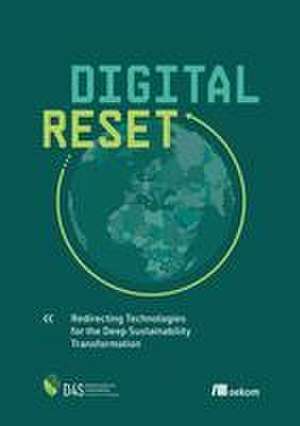Digital Reset
Autor Steffen Lange, Tilman Santarius, Lina Dencik, Tomas Diez, Hugues Ferreboeuf, Stephanie Hankeyen Limba Engleză Paperback – feb 2023
Preț: 140.79 lei
Nou
Puncte Express: 211
Preț estimativ în valută:
26.95€ • 29.28$ • 22.65£
26.95€ • 29.28$ • 22.65£
Carte indisponibilă temporar
Doresc să fiu notificat când acest titlu va fi disponibil:
Se trimite...
Preluare comenzi: 021 569.72.76
Specificații
ISBN-13: 9783987260223
ISBN-10: 398726022X
Pagini: 104
Dimensiuni: 206 x 293 x 9 mm
Greutate: 0.45 kg
Editura: Oekom Verlag GmbH
ISBN-10: 398726022X
Pagini: 104
Dimensiuni: 206 x 293 x 9 mm
Greutate: 0.45 kg
Editura: Oekom Verlag GmbH
Notă biografică
Lina Dencik is the Co-Director of the Data Justice Lab at the University of Cardiff and Professor at Cardiff's School of Journalism, Media and Culture. She examines the interplay between media developments and social and political change, with a particular focus on governance, resistance, and the politics of data. Tomas Diez is a founding partner and Executive Director of the Fab City Foundation and member of the board of trustees as well as senior researcher at IAAC Foundation. He examines the potentials of using digital fabrication tools to transform reality and how new technologies can change human living. Hugues Ferreboeuf is an Entrepreneur, Manager and Consultant, who also works as Project Director at The Shift Project in France. He advises companies and public bodies on how to transform themselves in order to deal with the digital, energy, and societal transitions. Stephanie Hankey is the co-founder and Executive Director of Tactical Tech and a Loeb Fellow at the Harvard Graduate School of Design. She is a practising designer, curator, educator and writer working at the intersection of design, technology, equity, and sustainability. is a senior researcher at the Institute of Integrative Biology at ETH Zurich. She focusses on the areas of environmental risk assessment, ecological biosafety of genetically modified crops, and farmer-participatory agroecology research. Lorenz M. Hilty is full professor at the Department of Informatics at the University of Zurich as well as Director of the Zurich Knowledge Center for Sustainable Development. He researches the opportunities and risks of digital technologies for sustainable development. Mattias Höjer is Professor in Environmental Strategies and Futures Studies at KTH Royal Institute of Technology. He works on smart sustainable cities and futures studies for sustainable development with a focus on energy use, and climate change mitigation. Dorothea Kleine is Professor of Human Geography and Co-Director of the Institute for Global Sustainable Development at the University of Sheffield. She investigates sustainable human development, global justice, and the role of digital technologies in making progress towards these aims. Johanna Pohl is a researcher at Technical University of Berlin. She investigates environmental effects of ICT-based services and develops basic approaches for a sustainable design of hardware and software. Lucia A. Reisch is El-Erian Professor and Director of the El-Erian Institute of Behavioural Economics & Policy at the University of Cambridge. She explores how insights from behavioral science can be used to promote sustainable consumption and production in digital consumer policy. Marianne Ryghaug is full Professor of Science and Technology Studies and leads the Center for Energy, Climate and Environment at the Department of Interdisiplinay studies of Culture at the Norwegian University of Science and Technology. She researches sociotechnical transitions in the areas of energy and climate policy, innovation policy, and public engagement. Tim Schwanen is the Director of the Transport Studies Unit and Professor of Transport Geography in the School of Geography and the Environment at the University of Oxford. He studies transportation in the context of rapid technological change, climate crisis and social inequality. Philipp Staab is Professor of Sociology of the Future of Work at ECDF and Humboldt-Universität zu Berlin. His research focuses on questions of the political economy of digitalisation, the connection between digitalisation and sustainability, and the role of critical infrastructures for the sustainability of modern societies.
